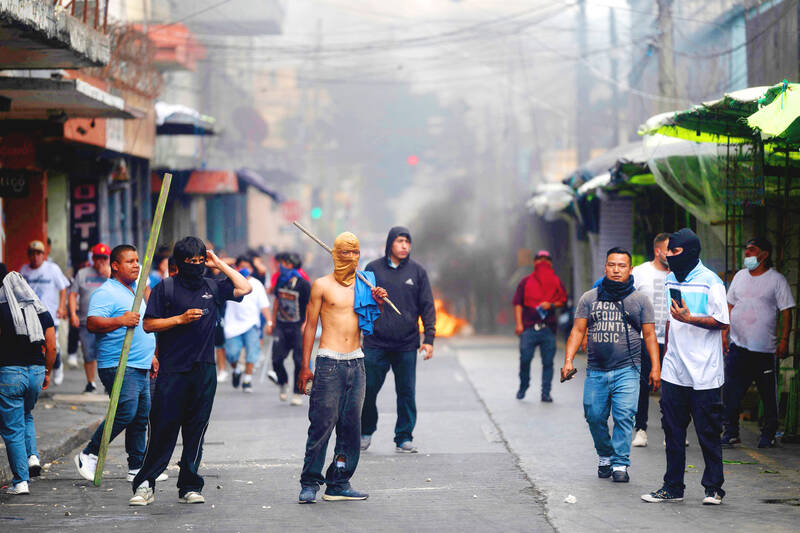Guatemala on Wednesday backed down on a new law forcing vehicle owners to take out insurance, suspending it following violent demonstrations.
The Central American country has been convulsed by two days of protests over the law, which was published on Monday and due to come into effect on May 1.
The government initially said that the reforms were necessary to compensate victims of road accidents and their families after a deadly bus collision that saw more than 50 people killed in February.

Photo: AFP
However, following nationwide demonstrations blocking about 30 roads, which saw police deploying tear gas on protesters, Guatemalan President Bernardo Arevalo said he would suspend the law.
That would “end the blockades and re-establish normal mobility throughout the country,” Arevalo said in a video posted online.
Protest organizers had agreed to set up a technical committee to implement regulations set out in the Guatemalan Traffic Act within one year, he added.
While the Traffic Act makes vehicle insurance compulsory, there is no regulation obliging vehicle owners to buy it.
The decree published on Monday would have required owners of cars, trucks, motorbikes and other motorized vehicles to take out insurance to cover harm they cause to others in the event of an accident.
This requirement came after a Feb. 10 incident, after 54 people were killed when a bus collided with several small vehicles and plunged into a ravine in Guatemala City, the nation’s capital.
“Road accidents are the main cause of death in the country, far more than crime,” a spokesman for the presidency told reporters earlier on Wednesday, calling the deaths a “national tragedy” that “must change.”
Opponents of the insurance requirement argued that many motorists, including taxi drivers, cannot afford to buy car insurance in Guatemala, where 60 percent of the population of more than 17 million lives in poverty.
The president said that the new requirement caused “understandable doubts in many households,” as it did not provide an estimation of insurance costs.

MONEY GRAB: People were rushing to collect bills scattered on the ground after the plane transporting money crashed, which an official said hindered rescue efforts A cargo plane carrying money on Friday crashed near Bolivia’s capital, damaging about a dozen vehicles on highway, scattering bills on the ground and leaving at least 15 people dead and others injured, an official said. Bolivian Minister of Defense Marcelo Salinas said the Hercules C-130 plane was transporting newly printed Bolivian currency when it “landed and veered off the runway” at an airport in El Alto, a city adjacent to La Paz, before ending up in a nearby field. Firefighters managed to put out the flames that engulfed the aircraft. Fire chief Pavel Tovar said at least 15 people died, but

South Korea would soon no longer be one of the few countries where Google Maps does not work properly, after its security-conscious government reversed a two-decade stance to approve the export of high-precision map data to overseas servers. The approval was made “on the condition that strict security requirements are met,” the South Korean Ministry of Land, Infrastructure and Transport said. Those conditions include blurring military and other sensitive security-related facilities, as well as restricting longitude and latitude coordinates for South Korean territory on products such as Google Maps and Google Earth, it said. The decision is expected to hurt Naver and Kakao

LIKE FATHER, LIKE DAUGHTER: By showing Ju-ae’s ability to handle a weapon, the photos ‘suggest she is indeed receiving training as a successor,’ an academic said North Korea on Saturday released a rare image of leader Kim Jong-un’s teenage daughter firing a rifle at a shooting range, adding to speculation that she is being groomed as his successor. Kim’s daughter, Ju-ae, has long been seen as the next in line to rule the secretive, nuclear-armed state, and took part in a string of recent high-profile outings, including last week’s military parade marking the closing stages of North Korea’s key party congress. Pyongyang’s official Korean Central News Agency (KCNA) released a photo of Ju-ae shooting a rifle at an outdoor shooting range, peering through a rifle scope

Australian Prime Minister Anthony Albanese yesterday said he did not take his security for granted, after he was evacuated from his residence for several hours following a bomb threat sent to a Chinese dance group. Albanese was evacuated from his Canberra residence late on Tuesday following the threat, and returned a few hours later after nothing suspicious was found. The bomb scare was among several e-mails threatening Albanese sent to a representative of Shen Yun, a classical Chinese dance troupe banned in China that is due to perform in Australia this month, a spokesperson for the group said in a statement. The e-mail